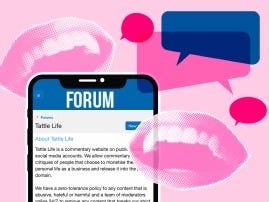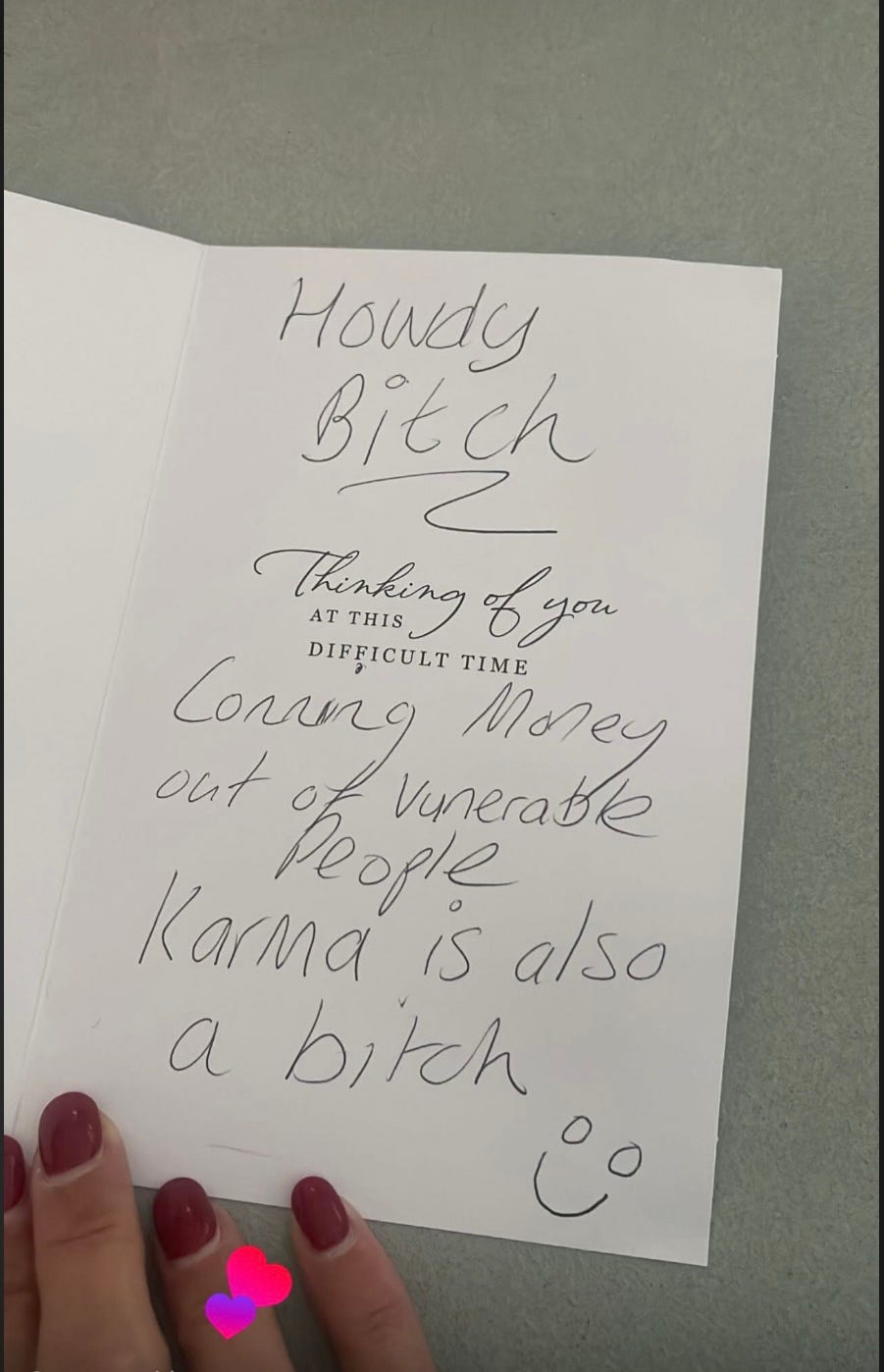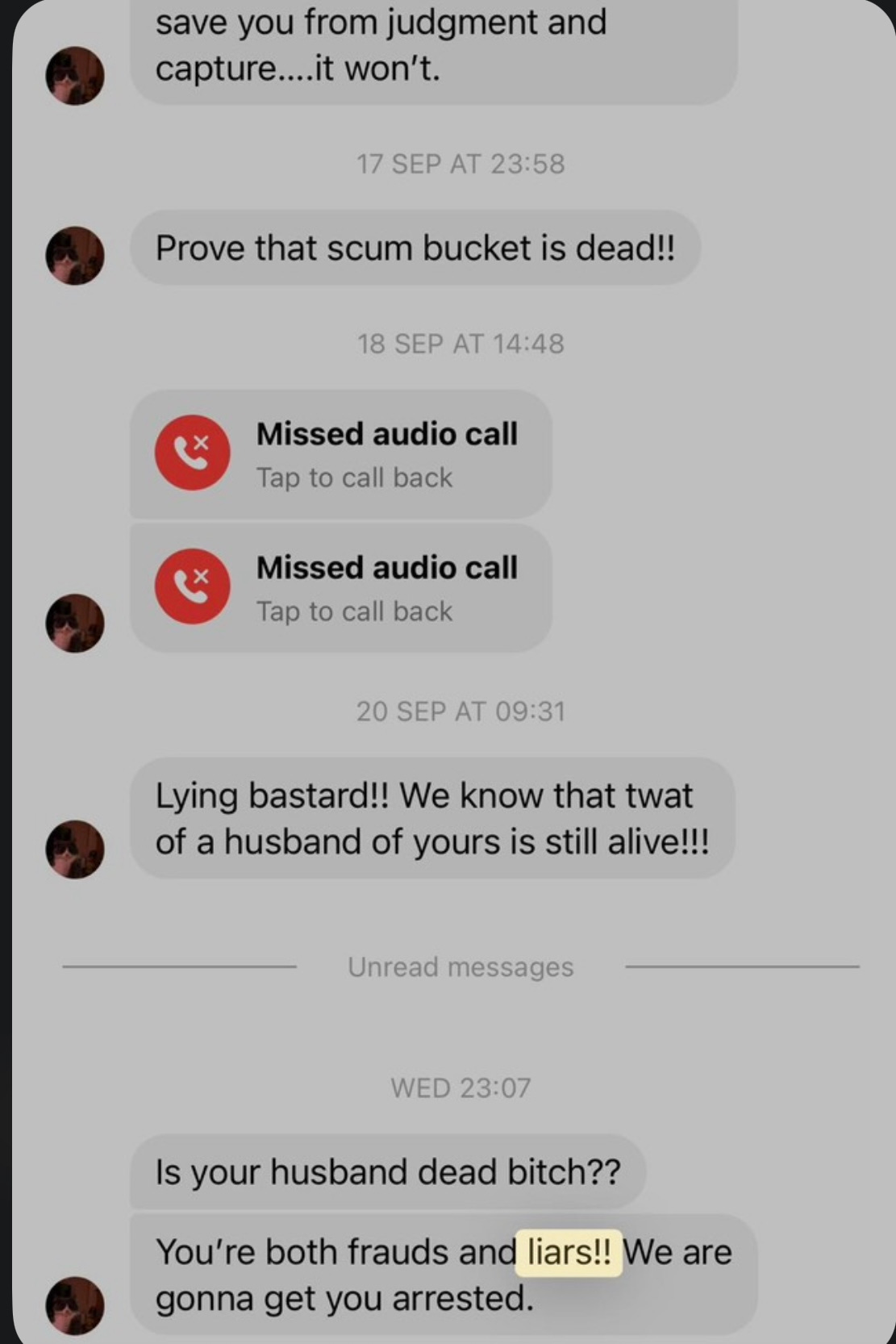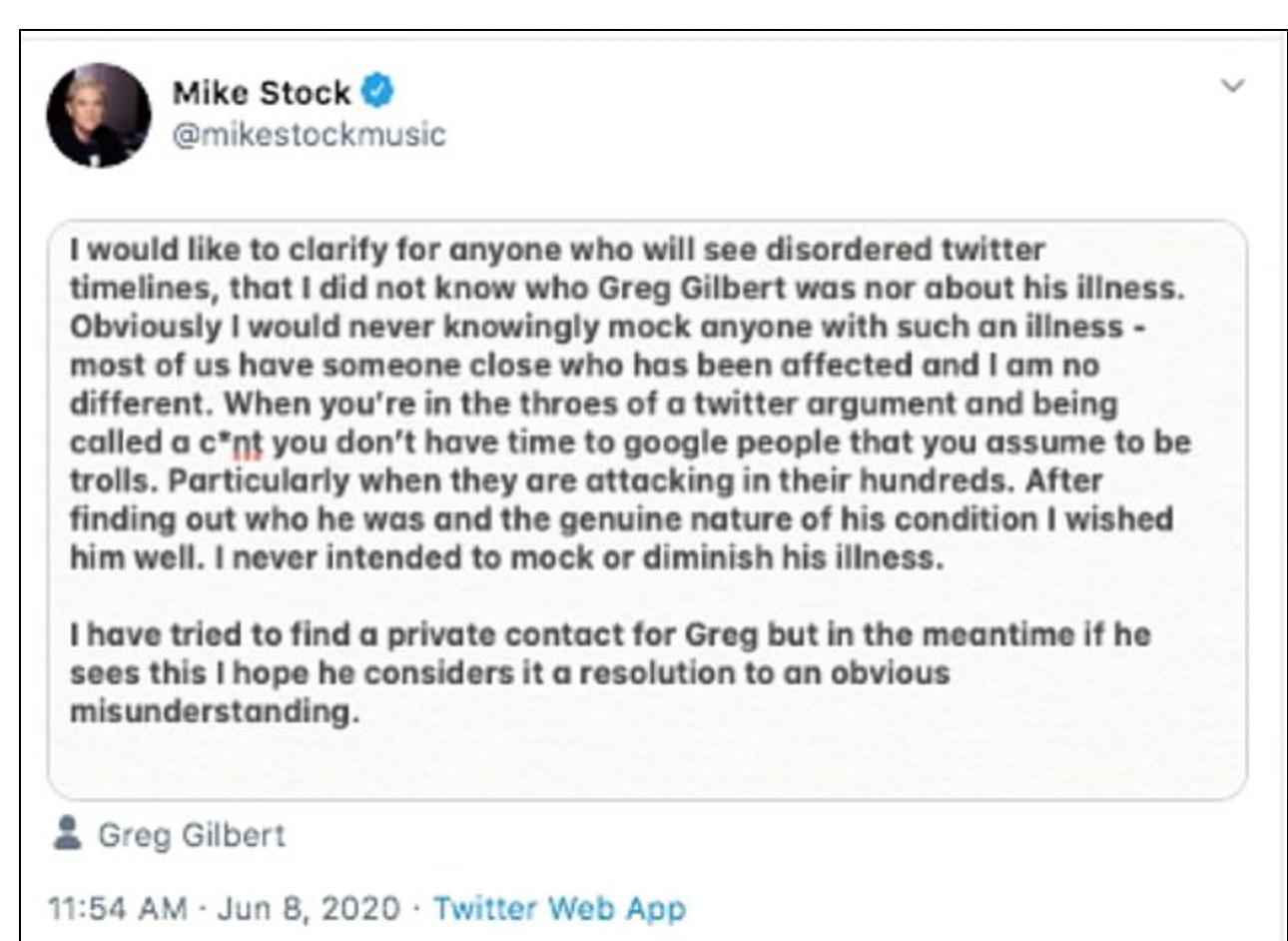When illness makes you a target for trolls
Inside the Tattle cancer controversy and other personal stories
In this weird hellscape called 2025, we finally get to relish a moment of sweet reckoning for someone determined to create more anguish in the world, making a huge sum of cash while doing so.
In a landmark lawsuit, the secret identity of ‘gossip’ website Tattle Life’s owner has been revealed as Sebastian Bond , better known online by the vegan influencer alias Bastian Durward. He was ordered by the Belfast High Court to pay a staggering £300,000 in damages to Neil and Donna Sands, a Northern Irish couple who sued for defamation after a 45-page thread on his web page spread horrific lies about them.
Sebastian Bond, who pretended he was a woman. Obviously.
This isn’t a website gone rogue; it was meticulously built by Bond to cultivate outrage. He is a weasel of the highest order, in every facet of his life (Google him) but this isn’t about him; it’s about the darkest corner of the online world he created.
The self-appointed judge and jury
If you don’t know what Tattle is, be very thankful. The website Tattle Life launched in 2018 and positioned itself as an unfiltered critique forum for those in the public eye, specifically influencers. You only need a quick glimpse on any thread to understand its vibe and purpose; Think less ‘idle water cooler gossip’, more ‘vitriolic and illegal hate mail’.
The Nancy Drew amateurs who comment there view themselves as an edgy and unvarnished ‘voice of the people’ to act as a vigilante crime force for unspeakable crimes as influencers not using the hashtag AD at the beginning of their posts. They are obsessed with authenticity, yet hide behind anonymous usernames and burner emails, unleashing allegations of crimes with no evidence, while doxxing and stalking strangers on the internet. Tattle members have no issue with throwing children’s safety into the ring either, with anonymous tips used to contact social services. You might find it hard to imagine people sat on their phones for hours, rattling off bile into the abyss at strangers but the scale is quite something; Tattle has 12 million monthly visitors.
In the irony of all ironies, the members of Tattle claim the moral high ground of freedom of speech and public accountability. Certainly, public figures should work within guidelines when there is money involved, but Tattle doesn’t deliver scrutiny so much as sensationalism and full-on conspiracy theories about strangers.
‘Cancer influencers’
Most people are stunned to hear they attack cancer patients but those in that category fit the criteria perfectly; their vulnerability is a ready-made spotlight. Reading through the “Cancer Influencers’ threads is like peering into the pits of hell. You’ll find deeply personal critiques; mocking of treatment choices and phsyscal appearance, questioning authenticity, and undermining people who chronicle illness as a way of coping.
Of the hundreds of people in the cancer community I’ve known online over the past decade, I have never heard anyone refer to themselves as a cancer influencer. If they have any kind of ‘influence’, it is highlighting symptoms, raising money for charity or documenting what the illness really looks like. If you are someone who does get involved in influencer-style work online and you have cancer, you are considered inauthentic and greedy scum. The fact that you have probably had to leave your job to have treatment is irrelevant.
They come for the most ill
It is the dregs of humanity who sit in the corners of these comment sections, gaslighting each other with hysteric posts suggesting these people with cancer are scam artists. The most well known example would be Dame Deborah James AKA Bowelbabe; documenting her stage IV diagnosis online meant she was subjected to armchair triage from thousands of anonymous strangers, who disseced her scans, finances and relationships with her children. In their eyes, her crime was not distinguishing at every moment which of her years of treatment was private and which was NHS. Debs raised £11 million for cancer research while in end-of-life care, while angry women (let’s be honest - it’s ABSOLUTELY women) wrote into the ether about how her teeth stuck out as her face shriveled.
The most deranged hounding came for Richard Davies AKA Bowelbro and his wife Lisa. Tattle whipped itself into a frenzy with much more than just disliking how Rich dressed; they created a team to contact his business partners, phone HMRC and query taxes, call Lisa’s employers – all under the guise of ‘finding out the truth’, of what was never very clear.
When Rich went into end of life care, Tattle went into overdrive with accusations of a hoax. They called the hospice, pretending to be doctors, trying to find out if he was there and what his current state was. His death was seen as something from a film, an elaborate lie with Rich off somewhere exotic living the high life. Tattle members called funeral homes, crematoriums and the local council to buy death certificates, all while Lisa was being contacted by phone and post, demanding to provide Rich’s body and admit he had never died.
Both images printed with permission
Similarities
I’ve looked at Tattle, many moons ago when I’d heard friends were being written about there. It was the viper’s nest I expected; just a hurricane of spiteful voices congratulating themselves on calling out grifters but I noticed a commonality in who took special umbridge with those who are ill.
Firstly, many of the commenters either had cancer themselves or had recovered from it. This immediately gives weight to their opinion and raises them to expert within the group. It is these voices who wrote the unspoken rules of ‘how to have cancer well’. They are very concerned with ideas of dignity, and what that should look like; not complaining, being grateful, very demure, very mindful. Dignity with cancer means NEVER partaking in trends on social media like TikTok dances or Instagram memes, believing they should be ashamed of themselves for such attention seeking.
“I would never have done that on the chemo ward, making it all about them”
“Those NHS nurses don’t want to have to deal with such a narcissist, they don’t get paid enough for this shit”
Secondly, I noticed commentators often spoke in the language of fake care while gently questioning the authenticity of those they are speaking about. The internet has taught us that cruelty doesn’t always look like yelling. Sometimes it looks like speculation, ‘feedback’ or my personal least favourite ‘asking the questions no one else will’.
“It’s just a bit odd, don’t you think, how she’s so ill after chemo then she’s out at an event?”
“I’m sure she’s genuinely poorly, but something about her vibe just feels off.”
“Not saying she’s faking, just that it doesn’t add up. My hair all fell out on chemo?”
They didn’t need to call someone a liar, they just need to plant the seed of doubt. And that what Tattle Life really is - not a single cruel comment, but an ecosystem of harm where suspicion breeds faster than facts or reason.
It’s obvious the goal was never clarity; it is about corrosion. This isn’t accountability. It’s intrusion disguised as righteousness. It’s the performance of moral concern, aimed squarely at people whose lives are already unimaginably hard.
My husband’s experience
My husband Greg had encountered his illness used against him online. In what now sounds like an Alan Partridge TV program suggestion, he found himself in an argument on Twitter with 80’s hit maker Mike Stock about Brexit.
Mike’s move away from politics and onto Greg’s terminal cancer created enough stir to be covered in the Daily Mail and for a formal apology to be released by his PR team. It seems obvious it’s never a good look to go after someone for their life-limiting illness, especially when you’re writing it ON THE INTERNET and you are famous.
Oh and P.S. Mike Stock absolutely did not try to apologise privately to Greg.
Greg also found himself victim to the more delightfully retro anonymous poison pen letter in the post. The hate mail arrived through the post containing a typed piece of A4, calling Greg out for his vocal views on politics post-Brexit and the beginning of Trumps first presidency. The tone was all very Enid Blyton and may have even used the word ‘twit’, until it suddenly became very snide and signed off with the conclusion that the world would be better off when Greg died.
I remember Greg and I having all sorts of emotions reading the letter together in our kitchen. First, we thought it was hilarious but soon started to wonder how this person had our address and what level of sanity they were working at to go to the lengths of thinking of the idea, writing it, printing it, putting it in an envelop, finding out our address, getting a stamp, walking to a postbox and actually posting it – that’s at least eight separate opportunities to realise how deranged you are.
I’ve had my own issues with anonymous strangers writing lies about me and going to great lengths to interfere with my income and reputation. I’ve never talked about a lot of this, have a listen here….
Keep reading with a 7-day free trial
Subscribe to Chaotic Hearts Club to keep reading this post and get 7 days of free access to the full post archives.











